Netanyahu Vows to Thwart Iran's Intentions to Destroy Israel 'At Any Cost'
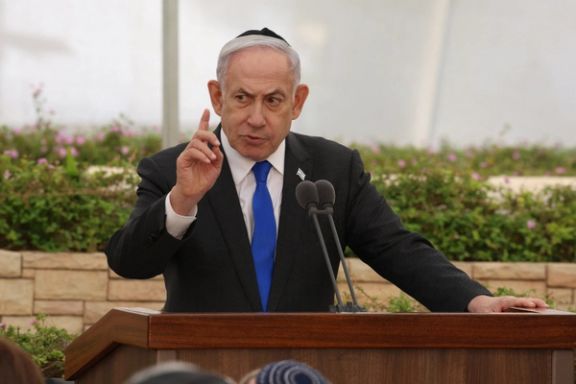
Israeli Prime Minister Benjamin Netanyahu says the Islamic Republic is working on all front to destroy Israel, but the Jewish state will thwart its intentions "at any cost".

Israeli Prime Minister Benjamin Netanyahu says the Islamic Republic is working on all front to destroy Israel, but the Jewish state will thwart its intentions "at any cost".
Netanyahu said on Monday that Tehran is actively working on multiple fronts to destroy Israel, highlighting the ongoing threat posed by Iranian proxy groups such as Hamas, Hezbollah, and the Houthis.
“At any cost and in any way, we will thwart Iran's intentions to destroy us,” the Israeli prime minister told the Knesset.
He described the situation as an "existential war on seven fronts," asserting that Iran is openly attempting to annihilate Israel.
Iran has long been a key supporter of both Hamas in Gaza and Hezbollah in Lebanon, providing financial aid, weapons, and training to these groups.
Since October 7, Israel has been engaged on two primary fronts: Gaza and Lebanon. Following a series of escalations, the Israel Defense Forces (IDF) have intensified their operations against Hamas in Gaza, aiming to dismantle its infrastructure and halt rocket attacks on Israeli territory. Concurrently, tensions with Hezbollah have flared along Israel's northern border with Lebanon.
In his Monday speech, Netanyahu said as the IDF advances deeper into Gaza, more evidence of Iran's anti-Israel activities has come to light.
He argued that Iran has underestimated both Israeli resilience and the country's determination to protect itself, stating that Israel is prepared to impose a significant toll on its aggressors.
His remarks come one day after the top US general warned that any Israeli offensive in Lebanon would risk a broader conflict that draws in Iran and its proxies, particularly if Hezbollah's existence is threatened.
"From our perspective, based on where our forces are, the short range between Lebanon and Israel, it's harder for us to be able to support them in the same way we did back in April," Brown said.
He was referring to a massive Iranian missile and drone attack against Israel from Iranian territory on April 13 that failed to inflict any serious damage as Israeli and allied forces downed almost all projectiles.
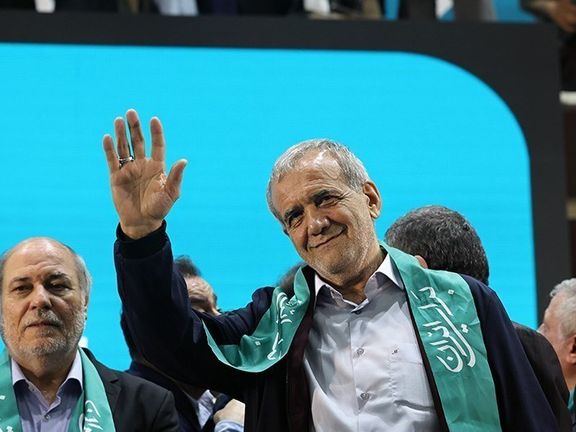
Masoud Pezeshkian, the only reform-leaning presidential candidate in the upcoming presidential elections, has revealed mass mismanagement and corruption plaguing the nation.
Speaking Monday, Pezeshkian revealed, "Money disappears in the country in amounts as significant as 70 trillion, and it is unclear where it goes, while our people have to search through garbage bins for a piece of bread to survive."
He did not specify whether the figure was in rials or tomans. If in rials, this equals around $116 million; if in tomans, approximately $1.16 billion. The revelation comes as Iran’s annual budget for the current year is over $100 billion and the six presidential candidates vie for the top seat.
Iran is currently grappling with gross embezzlement issues and widespread poverty, which have eroded public trust in governmental institutions and exacerbated social inequalities.
Numerous high-profile embezzlement cases have been uncovered, involving senior officials and businesspeople who exploit loopholes and weak oversight to siphon off public funds.
The systemic corruption drains crucial resources from public services and development projects, impacting the everyday lives of ordinary Iranians. Despite Iran's vast oil reserves and natural resources, a significant portion of the population struggles with poverty, high unemployment rates, and inflation.
At least one third of Iranians are now below the poverty line, forcing many to scavenge for food and essentials.
Iran's snap elections on June 28 follow the sudden death of Ebrahim Raisi last month in a freak helicopter crash.
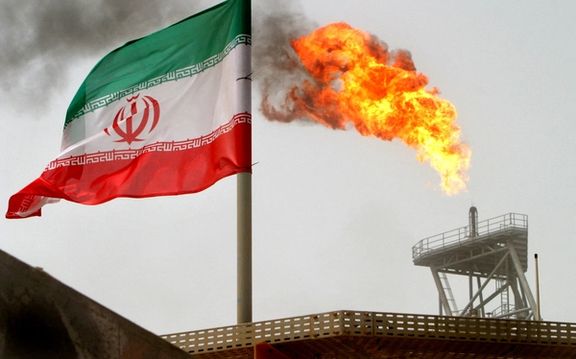
Hossein Selahvarzi, the former head of Iran's Chamber of Commerce, says sanctions have inflicted approximately $1.2 trillion in damages on the country between 2011 and 2023.
In comments published on Monday in Tehran's Shargh daily, Selahvarzi discussed the economic opportunities lost in Iran due to the sanctions. His remarks came just days before Iran's presidential election, where a victory for a hardline candidate could potentially prolong the stalemate in Iran's nuclear negotiations with global powers.
Saying that the issue of sanctions has not received much attention during the election campaign, Selahvarzi estimated that the lost per capita income for each Iranian due to sanctions over the 12-year period is around $14,000. In other words, each Iranian has lost an average of $1,202 annually due to the sanctions.
Selahvarzi did not specify the official sources of these figures. He explained that the estimates were based on comparisons with "several countries similar to Iran." He likely compared Iran's GDP and real per capita income with the averages of these countries, attributing the differences to the impact of the sanctions.
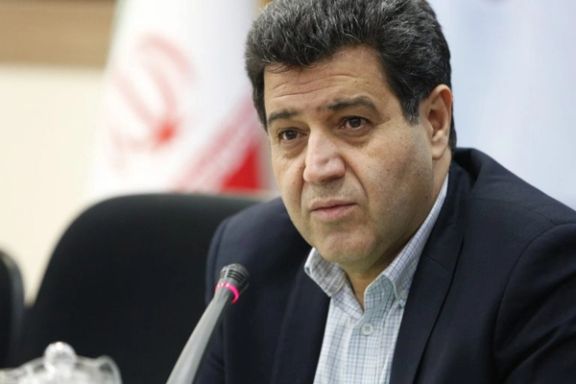
Masoud Pezeshkian, the reformist-backed candidate, has criticized the current situation, but the overarching policies are controlled by the Supreme Leader of the Islamic Republic, meaning that no matter who assumes the office of the president, little may change in policies that can help lift sanctions.
On Sunday, former Iranian President Hassan Rouhani said Iran incurred an annual loss of some $100 billion over the past three years due to sanctions that forced the country to sell limited amounts of oil and petrochemicals at discounted rates. Rouhani accused former president Ebrahim Raisi's government of "betraying" the Iranian people by causing $300 billion in damages over the course of three years.
Selahvarzi also commented on Iran's non-oil exports, saying: "The non-oil trade balance turned negative last year, and exports declined." He added that “both exports and imports were significantly impacted by sanctions."
Sanctions have not only hurt Iran's oil revenues and non-oil exports but also contributed to inflation and unemployment. The World Bank predicts Iran's GDP growth to continue its decline in 2024, falling below 2%. Presidential candidates are adamant that Iran's GDP growth can reach 8%, although none of them proposed any tangible plans to reach the long-sought goal.
Despite multiple rounds of negotiations between Tehran and world powers in 2021-2022, no agreement was reached to revive the JCPOA (Iran's 2015 nuclear deal). Lifting sanctions could improve Iran's economic situation, but this hinges on reaching an agreement with global powers.
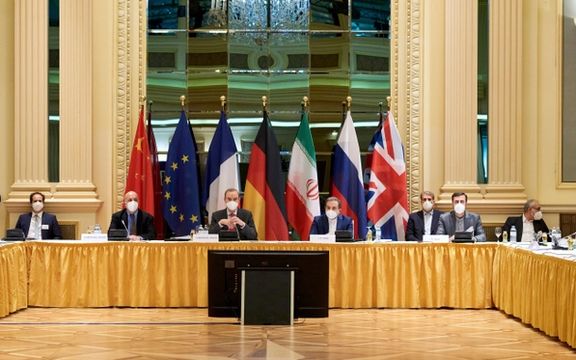
On Monday evening, Iranian presidential runners will hold their fourth debate, which will focus on foreign policy. No candidate has so far presented any comprehensive and clear plan to resolve strategic foreign relations issues.
Alireza Soltani, political economist told conservative Khabar Online website Monday that the main challenges the next president faces in foreign policy include Tehran-Washington relations, Iran’s nuclear program, and relations with international institutions and regulatory mechanisms, particularly the International Financial Task Force (FATF) and the World Trade Organization.
“Any incoming administration must strive to address the challenges in US-Iran relations. Resolving this conflict can pave the way for improved relations with Europe and many regional countries. Iran has lost numerous regional and international opportunities, both political and economic, due to its strained relations with the US. This includes economic cooperation with neighboring countries and relations with major powers like China and Russia, which have resulted in imbalanced and often unfavorable arrangements for Iran. Reducing tensions with Israel also hinges on resolving this issue,” he said.
According to Soltani, Iran's nuclear program has imposed "heavy economic and security costs on the country." He added that the next president should address the country's "weak economic, monetary, and trade relations," exacerbated by US sanctions, are further strained by international pressures and restrictions. These challenges particularly affect money transfers, attracting foreign investment, and international trade.
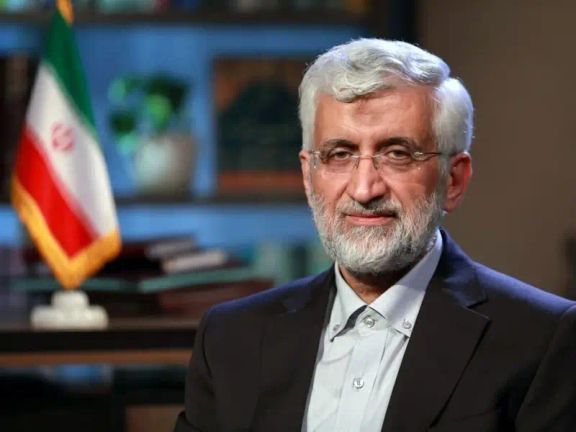
The Paydari party, a bastion of ultraconservatism in Iran, announced its support for Saeed Jalili in the upcoming presidential election on June 28.
The endorsement from the party, known as Steadfastness, highlights the division among the five hardliner candidates who are locked in a struggle over who should withdraw in favor of a unified conservative front.
Saeed Jalili, the Supreme Leader’s representative at the Supreme National Security Council, Parliament Speaker Mohammad Bagher Ghalibaf, Tehran Mayor Alireza Zakani, and Vice President Amir-Hossein Ghazizadeh Hashemi are all conservative contenders in the upcoming election.
If they do not agree to propose a consensus candidate, they risk losing in an election that many believe is merely a formality, with the winner already predetermined by Supreme Leader Ali Khamenei.
Originating during the presidency of Mahmoud Ahmadinejad, Paydari has continued to exert influence over Iranian politics. Known for its opposition to the nuclear deal (JCPOA) with world powers, the party's alignment with Jalili, a figure equally critical of the agreement, signals a continuing hardline stance that resonates with the more conservative elements of Iranian society.
As the hardliners fail to consolidate support, the fracturing may offer an unexpected advantage to the only more reformist candidate, Masoud Pezeshkian.
The elections on June 28 come in the wake of the sudden death of Ebrahim Raisi who died in a freak helicopter crash last month. Turnout is expected to be an all time low as the results are already deemed predetermined by the supreme leader.
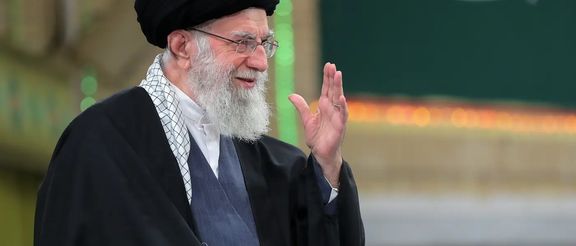
Mohammad Ali Movahedi Kermani, head of Iran's Assembly of Experts, has stated that late President Ebrahim Raisi was unfit to succeed Ali Khamenei as Iran's Supreme Leader.
"He would have definitely rejected the offer if it had been made," Kermani stated, directly addressing speculation about Raisi's potential ascension.
The sudden death of Raisi in a helicopter crash in May abruptly ended what some believed was his grooming for leadership, propelling Khamenei's son, Mojtaba, into the spotlight as a new frontrunner.
The comment highlights the opaque process of choosing Iran's leader, a position that will become vacant following ageing Khamenei's death.
The Assembly of Experts, elected to serve until 2032, is responsible for appointing the next leader, though the identity of the successor remains a closely guarded secret.
The Supreme Leader of Iran is chosen by the Assembly of Experts and serves for life. Article 111 of the Constitution of the Islamic Republic of Iran mandates that if the current Supreme Leader dies or is removed from office, the Assembly of Experts must convene immediately to name a successor.
In the interim, a 'Provisional Leadership Council' takes over the duties of the Supreme Leader. This council consists of the sitting President, the Chief Justice, and a cleric from the Guardian Council selected by the Expediency Discernment Council.
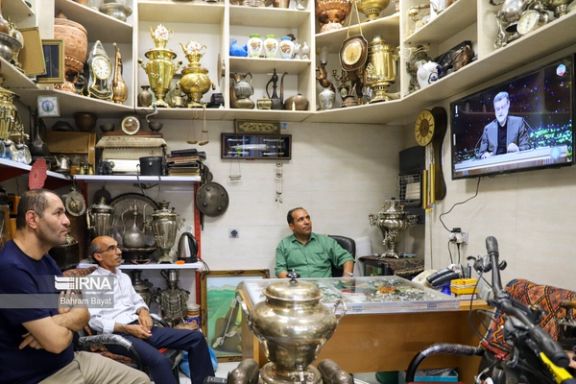
Iranian media and most social media users agree that the second and third televised "debates" among the six hand-picked presidential candidates in Iran last week were even more disappointing than the first one.
As the candidates prepare for their fourth debate on Monday, which will focus on foreign policy, observers are eager to see if any interesting issues or statements will emerge.
Many Iranian journalists, such as Sahand Iranmehr hesitated to call the second debate a "debate" as it was a series of individual monologues or sometimes a conversation between two of the candidates, Rouydad24 website observed.
Among the many problems noted by the media and netizens were the slow pace of the debates, the overly long introduction covering the candidates' arrival, prayers, and their walk through the state TV building, their awkward mumbling of the national anthem (which few knew by heart), and the repetitive, uninspired introduction by the state TV anchor. Even more annoying was the way the candidates were treated like naughty schoolboys in need of constant advice.
Regarding the form and format, these programs seem designed to discourage viewership. Everything about the setting is dull, tasteless, and rather banal. The scheduled 12-minute intermission on Thursday stretched to over half an hour, during which a helpless presenter repeated irrelevant information four times before the candidates returned to the studio, some still chewing the snacks offered by the organizers.
However, the content of the "debates" was even more problematic than the format. There was no meaningful difference among the candidates or their statements. Nearly everyone, except for cleric Mostafa Pourmohammadi in the second debate, who briefly outlined his plans for the presidency, seemed clueless about what they would do if elected.
Many, including the reformist candidate Masoud Pezeshkian said they did not need a plan because they were going to go ahead carrying out Supreme Leader Ali Khamenei's master plan for the country's future.
On the other hand, there was hardly any good speaker among them apart from Pourmohammadi. Some like Mohammad Bagher Ghalibaf and Alireza Zakani had many blunders that social media users joked about later. Zakani's remarks about helping pregnant women turned out to be too embarrassing while his remarks about giving gold to citizens in lieu of cash handouts were so outlandish that it was evident even in the mimics of other candidates.
Pezeshkian even did not defend himself against many attacks by his political rivals particularly Zakani, news websites in Tehran noted. His only significant statement was that he wanted to continue the path started by former reformist President Mohamad Khatami in the late 1990s. This prompted Zakani to say sarcastically that if Pezeshkian is elected president, his government will be Khatami's third term of office as President.
Former President Hassan Rouhani and former Roads and Urban Planning Minister Abbas Akhundi were so offended by some of the remarks made by conservative candidates that they asked for airtime to respond the accusations. As candidates have been "ordered" not to criticize the Raisi administration, they often make offensive remarks about Rouhani and his ministers and blame them even for problems that occurred under the Raisi administration.
Most of chronic problems the country faces, such as a 50% annual inflation rate, are largely the result of US economic sanctions, related to Iran’s nuclear program that is not the domain of any president to decide.
Many critics have noted that pro-reform candidate Masoud Pezeshkian's insistence on not differentiating himself from the conservative candidates is likely to negatively impact voter turnout in the upcoming election. Disillusioned voters may see no positive impact from his election.
Overall, the three rounds of debates on state TV have highlighted several issues with the candidates. They are not effective speakers, lack clear plans, and appear out of touch with Iranian society, showing little understanding of what Iranians want. They tend to create controversies because they have little to discuss about essential issues. Most importantly, none of them seem to have a clear reason for wanting to be Iran's President.